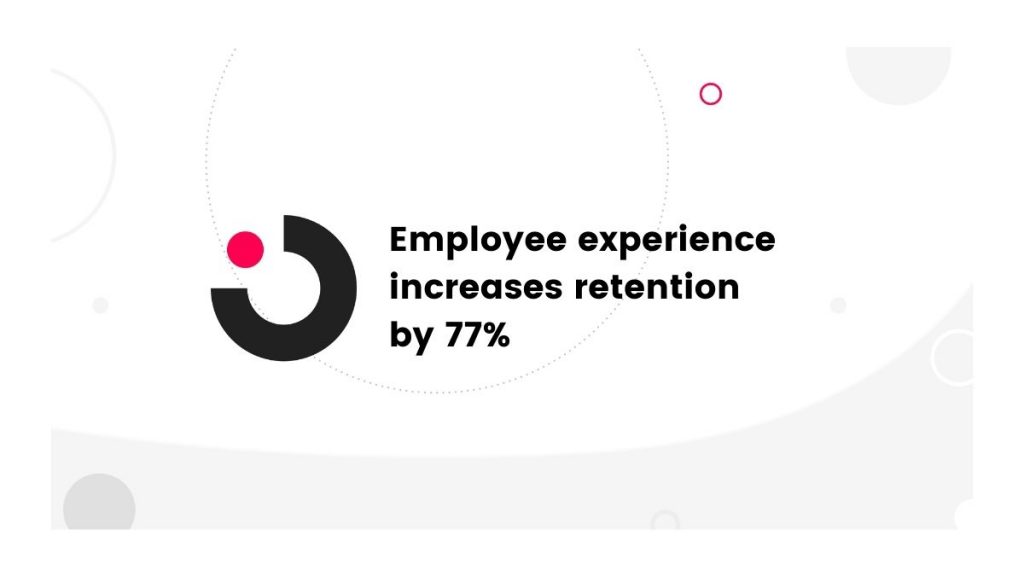
What is employee experience and why is it important?
As a leading company in your sector, you understand that your people are key to your success. For that reason it’s important to ensure your employees have a positive experience so they can do their best work and achieve great results. But what exactly is employee experience and why should your business invest in your employee experience?
We understand that as a business, often your primary focus is on your customers. After all, it’s your customers that buy your products or services. Without your customers, you have no business to speak of. That explains the rapid increase in customer service training that organisations employ.
Customer experience (CX) has long been at the forefront of leaders’ minds. Now, the realisation has dawned that EX is just as important for a whole host of other reasons.
What is employee experience?
On a simple level, EX is everything that an employee experiences at work. It is about what your employees see, feel, and encounter in the workplace.
EX is made up of:
- The physical space around employees (the home office for many of us)
- An employee’s work-life balance
- The leadership of the company and their team
- How technology is used
- How engaged an employee is with their company
- Benefits package including salary
- Employee support e.g. wellbeing initiatives, training programmes
EX is not just an HR function. Creating and supporting the EX goes far beyond HR. Ensuring that employees are cared for at every touchpoint during the journey with a company is no small task, but it is essential.
There are links to recruitment, leadership, and succession planning, as well as other factors like financial wellness and financial education. We’ll cover these later in the article.
What is an employee experience team?
An EX team is a team of specialists. It’s a team that, with the right individuals onboard, can have a dramatic impact on your workforce and your company’s bottom line.
By understanding the leadership team/worker relationship, an EX team can completely transform how your employees feel. Some aspects that an EX team should be responsible for include:
- Creating an EX framework
- Building a culture of trust
- Designing ways to measure EX
- Taking a proactive approach to employee wellbeing, including their financial wellness
- Giving employees a voice in the organization
- Asking for employee feedback to provide insights into improvements
Who’s in an employee experience team?
When it comes to your EX team, it’s important to realise that this is not a one-person role.
Just as your HR department will have differing levels, so must your EX team. Of course, the extent of your team will depend largely upon the size of your organisation, but typical roles include:
- Director of Employee Experience
- Head of Employee Experience
- Employee Experience Manager
- Employee Engagement Assistants
Ensuring that you have the right people in the right role is vital to the success of your EX team.
Employee experience vs employee engagement
Some believe that the terms employee experience and employee engagement are interchangeable. Let’s look at both:
Employee engagement
This is all about creating the right conditions for your workforce. It means an environment where employees are able to perform to their best ability every day.
To be successful, employee engagement requires commitment from your business. It also requires your employees to commit to and support your company’s goals and vision. Employee engagement tends to be measured at a particular moment in time.
Employee experience
This goes beyond how your employees feel at one particular moment. EX takes into consideration all that they see, hear, feel, and believe throughout their employee journey. This means ensuring that every touchpoint along the way provides a positive experience.
A natural by-product of a great EX is increased employee engagement. So while the two are separate there is a close link and even some overlap.
What do employees expect from your company?
If you want the best from your employees, getting the EX right is key. Money is no longer the primary motivating factor behind career decisions so as a company you need to provide far more than a good salary.
Here are some of the areas that your employees consider when consider their their experience at your company:
- Fairness in the company (decisions, salaries, behaviours etc)
- The values or ethos of an organisation
- Being equipped with the tools they need to do their job
- The physical workspace
- Being listened to and opportunities to contribute
- Their wellbeing, including financial wellbeing
- Rewards and recognition
- Benefits package
- The leadership style of the company
- Development and training opportunities
Knowing these aspects of your business form part of the EX means that you can take steps to address each of them, through your EX team, to perfect each of them.

Top tips for creating a great employee experience
When it comes to creating the optimum EX within your company, there are a few simple points to consider. Keeping these points in mind when investing in your employee experience can return huge benefits for your company in terms of employee engagement, a by-product of which is higher levels of retention.
Getting the EX right will also help your recruitment efforts. When you have attracted the top talent, you need to do everything to retain that talent.
Here are 6 top tips for creating a successful EX:
1. Effective onboarding
EX begins at the recruitment stage. In fact, it begins with your job advert.
The workplace is competitive and top talent has the choice of where to work. The application process is the first touchpoint in the employee journey. Getting this right, followed by effective onboarding leads to a happier employee.
Expertly on-boarded employees are motivated and inspired to deliver excellent work for your company. Get the on-boarding process wrong and you risk low morale and losing employees to another company
2. Look after your employees’ interests
Today’s employees are far more focused on work-life balance than a decade ago. While no longer live exclusively for our work, the financial aspect of work remains hugely important.
Looking after your employees’ financial wellbeing is an element of EX that is often overlooked. But when employees bring financial stress into the workplace, it can have a detrimental effect on their work and your wider company.
3. Talk (and listen) to your employees
Although it may sound like a cliché, an open-door policy works. Using this encourages transparency and with this comes trust.
Frequent and open communication allows employees and employers to give feedback and lets employees be heard. Understanding how your employees feel will provide you with (often simple) solutions to improve their pain points.
Small things make a big difference to employees. Don’t wait until they leave to find out.
4. Make your employees feel valued
Each time an organisational decision is made, you need to think about your employees.
- Has the time been taken to consider the impact on them?
- Has there been clear communication to keep them involved and feeling valued?
- How will your employees perceive the change?
- How will you manage the changes in a way that keeps employees engaged?
5. Keep pace with new employee benefits
When it comes to employee retention, being seen as a company with enviable employee perks goes a long way. It also helps with the recruitment stage.
This could include offering financial education and assisting your employees to reach a place of financial wellness.
6. Provide learning and development opportunities
Employees need to feel they are making progress and working towards their future. Career progression is an important element of our work and it helps employees feel more engaged with and motivated towards their work.
Employers can support employees with development and training opportunities that not only focus on existing roles, but considers where that employee might want to go next.
The benefits of a great employee experience
For a business to implement change, there must of course be a business case. This means that CEOs and HR leaders will be keen to know the business impact of implementing an EX team and what the potential benefits are before choosing to invest in employee experience.
Companies that invest in employee experience outperform those that don’t
We now know that EX boosts employee engagement. Studies show that companies with highly-engaged employees are 21% more profitable than those with a disengaged workforce. This is because a better EX leads to greater productivity and lower staff turnover rates.
Happy employees = more productive employees
Employees surrounded by a positive EX are more productive because they feel more positive about their workplace and their job. A study by LinkedIn found that EX increases productivity by 71%. Productive employees get better results.
However feeling happy at work is also dependent on an employees’ financial wellness so offering perks such as pay on demand can really help with this.
Employee experience reduces staff turnover
The EX is crucial to retaining employees. An employee that enjoys working for your company will always stay longer than someone who dreads coming to work everyday.
LinkedIn found that EX boosts retention by 77%. So if high turnover rates are affecting your business, then investing in your EX would be a smart move.
Employee experience boosts recruitment
One of the clear benefits of an EX team is that companies who invest in EX are perceived as better places to work. Having this sort of accolade will help you attract talent as individuals are drawn to working for companies that promise a fulfilling experience.
How employee experience promotes business sustainability
Investing in employee experience means that your company is setting itself up for long-term success.
When a company invests in building a strong employer brand it leads to attracting the right people for the right vacancies. Ensuring that these people go through an effective onboarding process means that they are likely to quickly become part of the team and be working towards the same goals.
EX assists your company when it comes to succession planning too. With an increase in employee retention, you will hold on to your talent and will fill internal positions with ease.
When employees can see that they are part of a succession plan and that there are clear opportunities to progress, they work hard. They ensure that they improve relationships within the company and this leads to more collaborative working and inspiration.
The benefits of investing in your company’s employee experience are far-ranging. This is a part of your business you simply cannot ignore. So if you haven’t already got an EX team, then it’s time to start writing that business case.
Check out our other articles on our blog page and follow us on social media to see our latest articles, insights, and company news.

